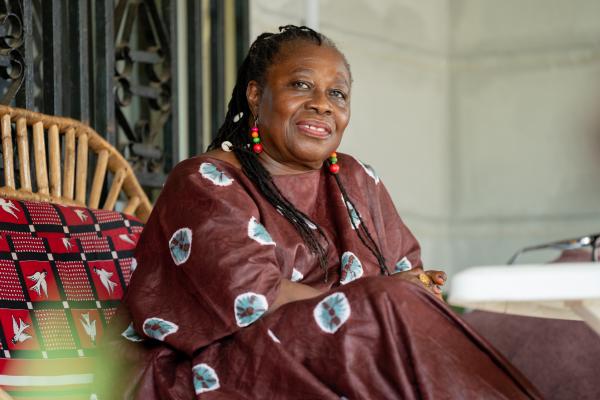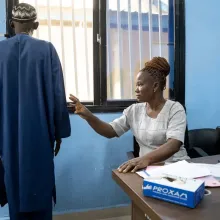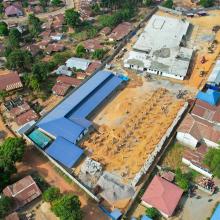Nyandemo is a community leader and educator. She is also a mother working to ensure that no other family in Sierra Leone experiences what she did. Her journey in sickle cell advocacy began with the loss of her two daughters, Tenema and Miatta. Her children presented with symptoms in the 70s, a time when awareness, screening, and treatment were non-existent in Sierra Leone. With symptoms misunderstood and blame placed on witchcraft, she struggled alone with no support or diagnosis.
Sickle cell disease is a genetic condition that affects the shape of red blood cells, turning them from round and flexible to stiff and crescent shaped. These cells block blood flow, causing extreme pain, infections, and severe complications like organ damage. It also leads to chronic anemia or low blood levels.
In Africa, an estimated 240,000 babies are born with the disease each year. Up to 80% will die before the age of five, often from preventable complications like severe infections or acute chest syndrome.
Despite growing global attention, many countries like Sierra Leone still face challenges in tackling the disease due to poor health care infrastructures, limited access to screening, research and treatment.
In Kono district, sickle cell disease services are a cornerstone of the new Non-Communicable Disease (NCD) clinic at Koidu Government Hospital (KGH). The clinic currently serves over 300 patients with sickle cell disease. Patients benefit from free medical consultations and follow‑ups, laboratory and diagnostic services, and medications. Going beyond medical care, the team provides social support to the most vulnerable patients, reaches out to the community with awareness campaigns on TV and radio, and invites families in for sickle cell disease screenings. By delivering these integrated services, KGH’s NCD clinic exemplifies how mid‑level providers can be empowered to treat complex NCDs in rural settings.
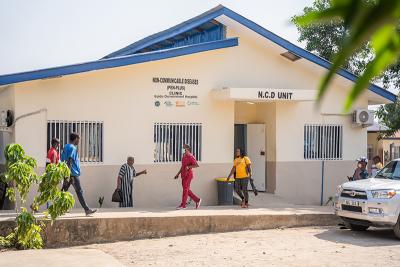
The NCD clinic expansion building officially opened on February 4, 2025.
Chiara Herold / PIH
Together with SCCAN, Partners In Health Sierra Leone (PIH-SL) has screened over 1200 women for sickle cell traits since July last year. Those who tested positive are receiving antenatal care, counseling, and have become part of the monthly support group led by Nyandemo’s team.
As co-founder and national coordinator of SCCAN, Nyandemo provides awareness about sickle cell disease to community members, raises funds for the work, and manages the day-to-day operations. In this interview, she shares her personal story, her work with SCCAN, and her vision for sickle cell management in Sierra Leone.
When did you first learn about sickle cell disease?
A month after I lost my first daughter, my second began showing the same symptoms. We were sent to Panguma, near Kenema, where doctors took blood samples and quietly confirmed she had sickle cell. They gave her a blood transfusion but didn’t explain what sickle cell was, how to manage it, or what we should expect.
It was after moving to the UK, while sitting on a bus that I saw a sign for the Sickle Cell Society. I got off the bus at the next stop and walked back to the Sickle Cell Society Centre. The staff welcomed me warmly and handed me pamphlets filled with information I had never seen before. For the first time, I truly understood what had happened to my children. I finally learned that both my husband and I carried the sickle cell gene and we had unknowingly passed it on.
I started sending the materials back home to my cousin, a nurse who was helping care for my surviving daughter. Eventually, my daughter joined us in the UK. We took her straight to the doctor.
What was it like when your daughter finally received the right care?
For the first time, someone reached out, touched her hand, and gently asked how she was feeling. I broke down in tears. The doctor immediately called an ambulance and she was admitted to the hospital. The medical team explained what my daughter had been going through. They told me about the intense pain she was in and reassured me that pain could be managed safely. I was heartbroken. It was the first time I truly realized how much suffering she had endured in silence. I began to understand that this disease doesn’t just affect the body, it takes a toll on the mind too.
How did you begin your work in Sierra Leone?
My husband and I agreed that everything we had learned through our experiences needed to be shared. We didn’t have money but we had knowledge that could save lives. We started small. I called my cousin and shared my idea. I sent her the parent guidebook and taught her everything I had learned. We began by sending £20 to buy rice, folic acid, and vitamin C to help five children.
Many people believed a witch had caused my daughters’ deaths and for a long time, I believed it too. But once I understood the science, I went back to my community with a new message. I asked the chief to gather people from Nimikor Chiefdom and more than 1,000 people came.
I told them, “The witch that killed our children is called sickle cell.” I brought a diagram and explained in our local language what the disease does to the body. I apologized to an aunty I had wrongly accused and forgave those who had blamed me. Most importantly, I forgave myself.
Today, over 2,000 children and adults are in our system. Every time I see one of these children, I see my daughters. I know that they did not die in vain. The mistakes, mismanagement, and pain were part of my training.
Why did you find it important to focus on carers as well?
When my children were sick, I was always at the hospital. I was constantly worried and exhausted. But no one ever asked how I was doing. Everyone asked how the children had slept, whether they had eaten but no one looked at the person caring for them.
When I moved to the UK, I found support through a carers’ network. We met regularly, talked, and shared our experiences. Even though each child’s situation was different, we all needed the same kind of support.
What kind of support does SCCAN provide to carers and families in Kono?
We provide children and families with medication and management advice to help reduce the frequency and severity of pain crises. These crises can be triggered by stress, dehydration, and infections, things that are often unavoidable in their environment. When we have the resources, we also support them with clothing and food so they don’t take medication on an empty stomach. In addition, we offer screening and counseling to help families understand the condition and make informed decisions.
Can you tell us more about SCCAN’s partnership with Partners In Health Sierra Leone (PIH-SL)?
We had conversations with PIH-SL over the years but our formal collaboration began in 2023. Through this partnership, we screen mothers and children for sickle cell disease. PIH-SL is instrumental in helping us purchase screening kits and supports midwives who are assigned to work with us. With this help, SCCAN conducts community outreach activities for women of reproductive health age and provides specialized antenatal care and psychosocial support for pregnant women with sickle cell disease.
How did you feel when the new Non-Communicable Disease clinic opened at KGH?
This was a major highlight in my life. A dream come true! Finally, we had a place to call our own. A place where people living with sickle cell could go, be heard, receive treatment, and feel safe enough to open up and talk. PIH-SL provides free medication which is critical.
How have you seen attitudes and awareness around sickle cell change in the community since you started SCCAN?
Attitudes have changed a lot but there’s still so much more to do. We’re based here in Koidu, what about villages we haven’t been able to reach? In the past, when children were in pain, they would cry out, “Tie me, tie me.” People believed that tying them tightly would reduce the pain but it would only numb the area. With sickle cell, you’re already struggling with blood circulation and tying someone only makes it worse. We started teaching people safer ways to manage pain. We showed them how to gently massage the area with oil or body butter, how to use a hot water bottle to warm the painful joints, and how important it is for the child to drink plenty of water. Every time someone goes into a pain crisis, it damages their heart, kidneys, liver, and more. That’s why education is important.
What SCCAN now needs is to strengthen our lab services and get more qualified sickle cell health care professionals in all areas. For example, midwives, genetic counsellors, advocates, and hematologists.
How will the Maternal Center of Excellence (MCOE) affect the lives of babies born with sickle cell?
I am on the steering committee and when I saw the facility, I remember saying that I would love to give birth now. I hope no one gives birth to a child with sickle cell but if it happens, it’s not as scary because of MCOE.
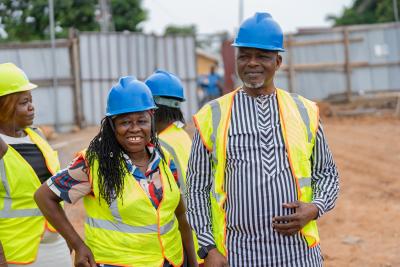
Sia Evelyne Nyandemo (left), alongside Chief Toreheh Foyoh IV (right), tours the Maternal Center of Excellence construction site as a dedicated member of the local steering committee in Kono District.
Sean Andrew Bangura / PIH
If you could send one message to the world about sickle cell and those who care for sufferers, what would it be?
Don’t lose hope. We must hold on. We must keep raising awareness and supporting one another because none of us can do this alone.
